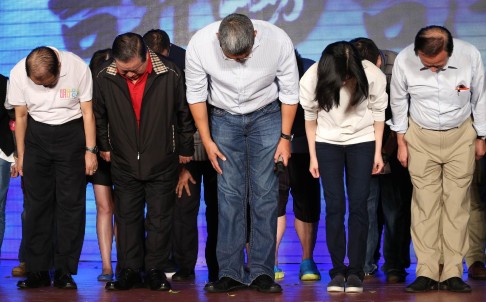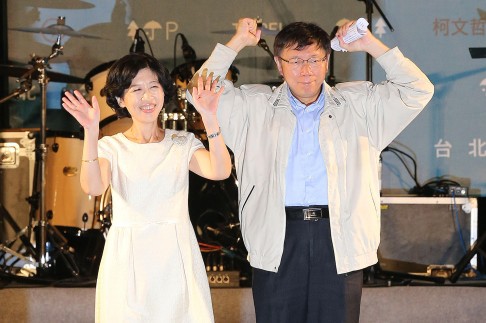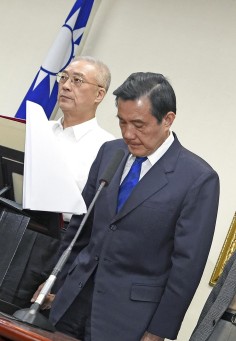- Joined
- Feb 26, 2012
- Messages
- 15,733
- Points
- 83
Taiwan’s opposition looks set to make comeback in elections
Polls suggest the Democratic Progressive Party (DPP) has a good chance of beating the ruling Kuomintang (KMT) in the local elections on Saturday (Nov 29), and is leading in four out of six special municipalities.
TAIPEI: Taiwan’s opposition Democratic Progressive Party (DPP) seems to be making a comeback. Polls suggest the DPP has a good chance of beating the ruling Kuomintang (KMT) in the local elections on Saturday (Nov 29), and is leading in four out of six special municipalities. The DPP’s victory is expected to pave the way for a better shot at the island's top post in 2016.
Saturday’s elections will be Taiwan’s biggest local elections in history, with the results widely viewed as a political barometer for the presidential elections in 2016.
Professor Wang Yeh Li from the National Taiwan University said: "DPP's mayors and county magistrates generally enjoy higher approval ratings based on various polls. Kaohsiung city mayor Chen Chu and Tainan city mayor William Lai for instance, are among the top performers. This has ignited the hope that DPP might return to power.”
DPP chairwoman Tsai Ing-wen lost the presidential race in 2012 to Ma Ying-jeou by 6 per cent of the vote. Her defeat was widely attributed to the DPP's lack of a feasible China policy.
But recent troubles across the Taiwan Straits may have bolstered Ms Tsai's chances in 2016. "The Sunflower Movement on Mar 18 has highlighted the concerns among the Taiwanese people towards China. In the past, you tended to get more votes if you were closer to China, but now it's the opposite," said Professor Fan Shih Ping from the National Taiwan Normal University.
If the DPP beats the KMT in the mayoral elections, the party would gain more political leverage to compete in the presidential race. Analysts said even Beijing is preparing itself for a possible change of power on the island. "That's why Chinese President Xi Jinping decided to give Taiwan an ultimatum, which is the 'one country, two systems.' But that remark may actually deepen the legitimacy of the DPP's pro-independence stance," said Professor Chang Ya Chung from the National Taiwan University.
Professor Wang, meanwhile, said: “Beijing will be closely monitoring and assessing the possibility of the DPP returning back to power. If the DPP regains power, they will not be like the KMT in their way of dealing with Beijing. They may want to reassess all major political and economic policies with China."
A DPP victory in the local elections will no doubt give the party a shot in the arm for the presidential vote in two years' time. But without a workable China policy that is acceptable to Beijing, analysts warned the DPP could put cross-strait relations into reverse gear.
- CNA/nd
http://www.channelnewsasia.com/news/asiapacific/taiwan-s-opposition-looks/1498498.html
Polls suggest the Democratic Progressive Party (DPP) has a good chance of beating the ruling Kuomintang (KMT) in the local elections on Saturday (Nov 29), and is leading in four out of six special municipalities.
TAIPEI: Taiwan’s opposition Democratic Progressive Party (DPP) seems to be making a comeback. Polls suggest the DPP has a good chance of beating the ruling Kuomintang (KMT) in the local elections on Saturday (Nov 29), and is leading in four out of six special municipalities. The DPP’s victory is expected to pave the way for a better shot at the island's top post in 2016.
Saturday’s elections will be Taiwan’s biggest local elections in history, with the results widely viewed as a political barometer for the presidential elections in 2016.
Professor Wang Yeh Li from the National Taiwan University said: "DPP's mayors and county magistrates generally enjoy higher approval ratings based on various polls. Kaohsiung city mayor Chen Chu and Tainan city mayor William Lai for instance, are among the top performers. This has ignited the hope that DPP might return to power.”
DPP chairwoman Tsai Ing-wen lost the presidential race in 2012 to Ma Ying-jeou by 6 per cent of the vote. Her defeat was widely attributed to the DPP's lack of a feasible China policy.
But recent troubles across the Taiwan Straits may have bolstered Ms Tsai's chances in 2016. "The Sunflower Movement on Mar 18 has highlighted the concerns among the Taiwanese people towards China. In the past, you tended to get more votes if you were closer to China, but now it's the opposite," said Professor Fan Shih Ping from the National Taiwan Normal University.
If the DPP beats the KMT in the mayoral elections, the party would gain more political leverage to compete in the presidential race. Analysts said even Beijing is preparing itself for a possible change of power on the island. "That's why Chinese President Xi Jinping decided to give Taiwan an ultimatum, which is the 'one country, two systems.' But that remark may actually deepen the legitimacy of the DPP's pro-independence stance," said Professor Chang Ya Chung from the National Taiwan University.
Professor Wang, meanwhile, said: “Beijing will be closely monitoring and assessing the possibility of the DPP returning back to power. If the DPP regains power, they will not be like the KMT in their way of dealing with Beijing. They may want to reassess all major political and economic policies with China."
A DPP victory in the local elections will no doubt give the party a shot in the arm for the presidential vote in two years' time. But without a workable China policy that is acceptable to Beijing, analysts warned the DPP could put cross-strait relations into reverse gear.
- CNA/nd
http://www.channelnewsasia.com/news/asiapacific/taiwan-s-opposition-looks/1498498.html





